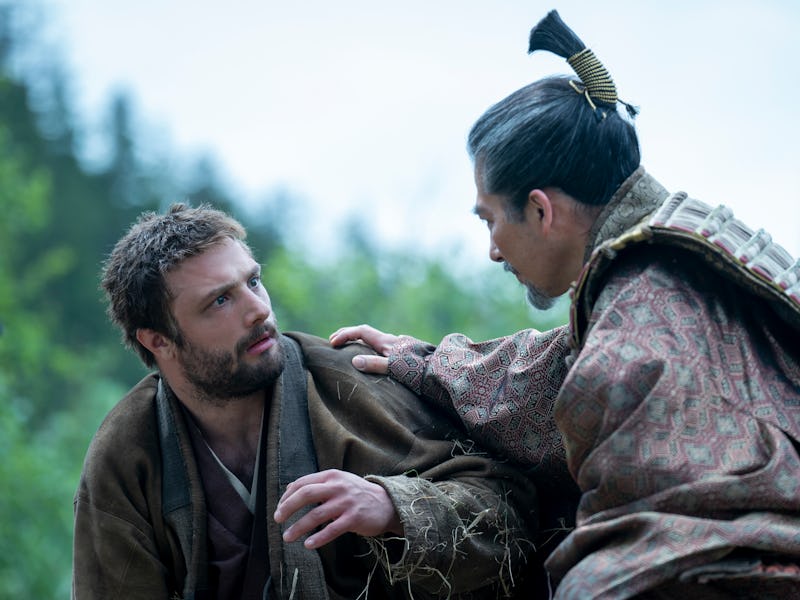Shogun Followed Its Own Rules Right to the Very End
The FX miniseries went out exactly as it should have: quietly.

Shogun, one of the year's best shows, wrapped up its 10-episode season this week. Its finale, titled "A Dream of a Dream," brought with it plenty of revelations, one tragic yet inevitable death, and an appropriately melancholic conclusion to the fish-out-of-water story of John Blackthorne (a revelatory Cosmo Jarvis). What about what the episode didn't have? Huge battles, for one, along with any last-minute twists or oversized moments of spectacle.
Indeed, despite boasting a blockbuster budget, Shogun refused to ever deviate from the tone, pace, and focus of its opening episodes. It delivered its biggest set pieces early — namely, Toranaga's (Hiroyuki Sanada) escape from Osaka — and then ended by revealing that "Crimson Sky," its heroes' much-anticipated military assault, was actually a one-person incursion executed by Mariko (Anna Sawai) in its penultimate installment.
To put that another way: In all the moments when most shows of its size and scope would have felt pressured to go big, Shogun always did the opposite.
In the end, only Yabushige (Tadanobu Asano) is allowed to learn the full scope of Toranaga’s (Hiroyuki Sanada) plans.
To watch TV in 2024 is to see a lot of shows that are just as expensive as Shogun — if not more. Game of Thrones, with its CGI dragons and massive battle episodes, redefined what many believed could be done on television, and plenty of similarly ambitious blockbuster shows have followed in its footsteps. In the weeks since it premiered, Shogun has received plenty of comparisons to Thrones, too, and it's not hard to see why. Its production design is just as astonishing, plotting just as masterful, and level of immersion similarly breathtaking.
While the two shows share a lot in common, though, Shogun is a very different TV series than Game of Thrones. For all of its behind-the-scenes instances of politicking, Thrones was ultimately a TV show built around great characters and flashy, conversation-starting moments. Shogun's 10 episodes have plenty of the former, but fewer of the latter. It's a TV show that, for the most part, doesn't indulge in the same kind of explosive set pieces or shocking deaths commonly associated with Thrones. The FX miniseries prizes subtler moments of political brilliance and personal epiphanies over everything else, and that's particularly clear in its finale.
The episode, set in the wake of Mariko's fatal sacrifice, follows Blackthorne and Yabushige (a scene-stealing Tadanobu Asano) as they return to Ajiro and come to terms with their respective futures. Yabushige vows to commit seppuku for his role in Mariko's death, while Blackthorne pleads for Toranaga to exercise mercy on the village's inhabitants after his ship is destroyed. The latter attempts seppuku — fully surrendering to the Japanese customs he's resisted for so long — only to be stopped by Toranaga, who later reveals that he intends to keep Blackthorne in Japan forever. In the same scene, he quietly confesses, albeit indirectly, the full scope of his plan to Yabushige in a cliffside conversation unheard by anyone else.
Almost everything in the episode plays out in a purposefully muted fashion. Even its brief flashforward to Toranaga’s eventual victory over Ishido (Takehiro Hira) ends with the latter’s expression silently changing to one of bitter defeat rather than going so far as the book that Shogun is based on, which reveals that Toranaga celebrated his triumph by burying Ishido up to his neck and leaving him to die. It's a decision that may come as a surprise to some, but is in keeping with Shogun's contemplative tone and style, which involves a greater focus on its actors' faces and expressions than on wide-angle sword fights and military battles.
Shogun ignores every trope of the modern blockbuster TV era, and that’s what makes it great.
As diverse as the current TV landscape is, it's hard to find new shows that don't feel like they adhere to certain established formulas. That’s partly what makes Shogun so special. It's a miniseries that establishes its own, patient rhythm and sticks to it even when it seemingly flies in the face of modern genre and TV conventions. That's a change of pace that is as refreshing as it is welcome. By refusing to deviate from the path it set for itself, Shogun has proven that there's more than just one way to do a blockbuster TV show in our current, post-Game of Thrones era.
Its popularity has, in turn, proven that audiences will support even an epic as quiet and considered as Shogun — so long as the creative decisions made throughout it truly are in service of its story.